Roles and Responsibilities of RN Nurse: Case Study Analysis
VerifiedAdded on 2023/06/04
|9
|3363
|63
AI Summary
This report discusses the roles and responsibilities of RN nurses, with case study examples and recommendations for graduate nurses. It also explores evidence-based strategies to promote resilience and self-capability of nurses during the transition period.
Contribute Materials
Your contribution can guide someone’s learning journey. Share your
documents today.
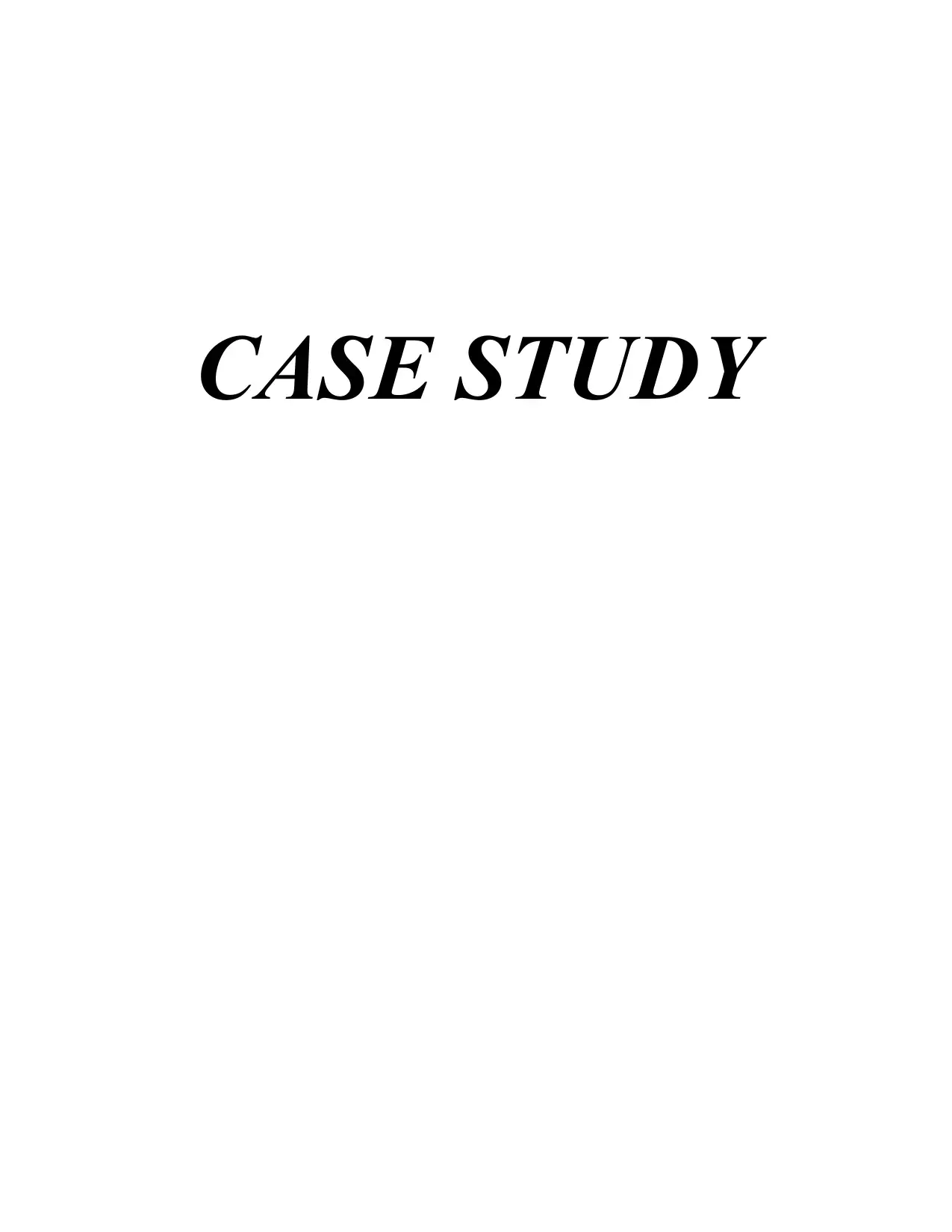
CASE STUDY
Secure Best Marks with AI Grader
Need help grading? Try our AI Grader for instant feedback on your assignments.
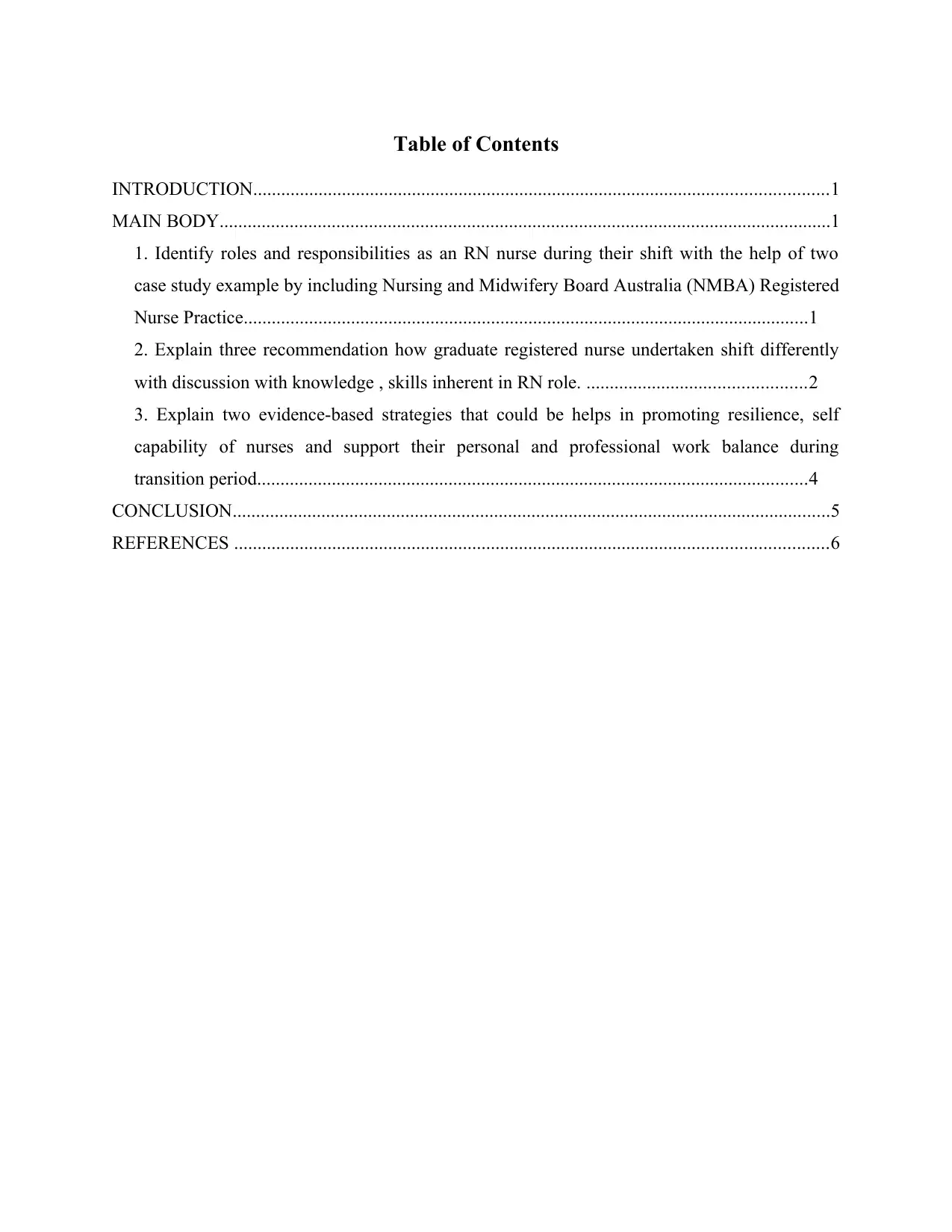
Table of Contents
INTRODUCTION...........................................................................................................................1
MAIN BODY...................................................................................................................................1
1. Identify roles and responsibilities as an RN nurse during their shift with the help of two
case study example by including Nursing and Midwifery Board Australia (NMBA) Registered
Nurse Practice.........................................................................................................................1
2. Explain three recommendation how graduate registered nurse undertaken shift differently
with discussion with knowledge , skills inherent in RN role. ...............................................2
3. Explain two evidence-based strategies that could be helps in promoting resilience, self
capability of nurses and support their personal and professional work balance during
transition period......................................................................................................................4
CONCLUSION................................................................................................................................5
REFERENCES ...............................................................................................................................6
INTRODUCTION...........................................................................................................................1
MAIN BODY...................................................................................................................................1
1. Identify roles and responsibilities as an RN nurse during their shift with the help of two
case study example by including Nursing and Midwifery Board Australia (NMBA) Registered
Nurse Practice.........................................................................................................................1
2. Explain three recommendation how graduate registered nurse undertaken shift differently
with discussion with knowledge , skills inherent in RN role. ...............................................2
3. Explain two evidence-based strategies that could be helps in promoting resilience, self
capability of nurses and support their personal and professional work balance during
transition period......................................................................................................................4
CONCLUSION................................................................................................................................5
REFERENCES ...............................................................................................................................6
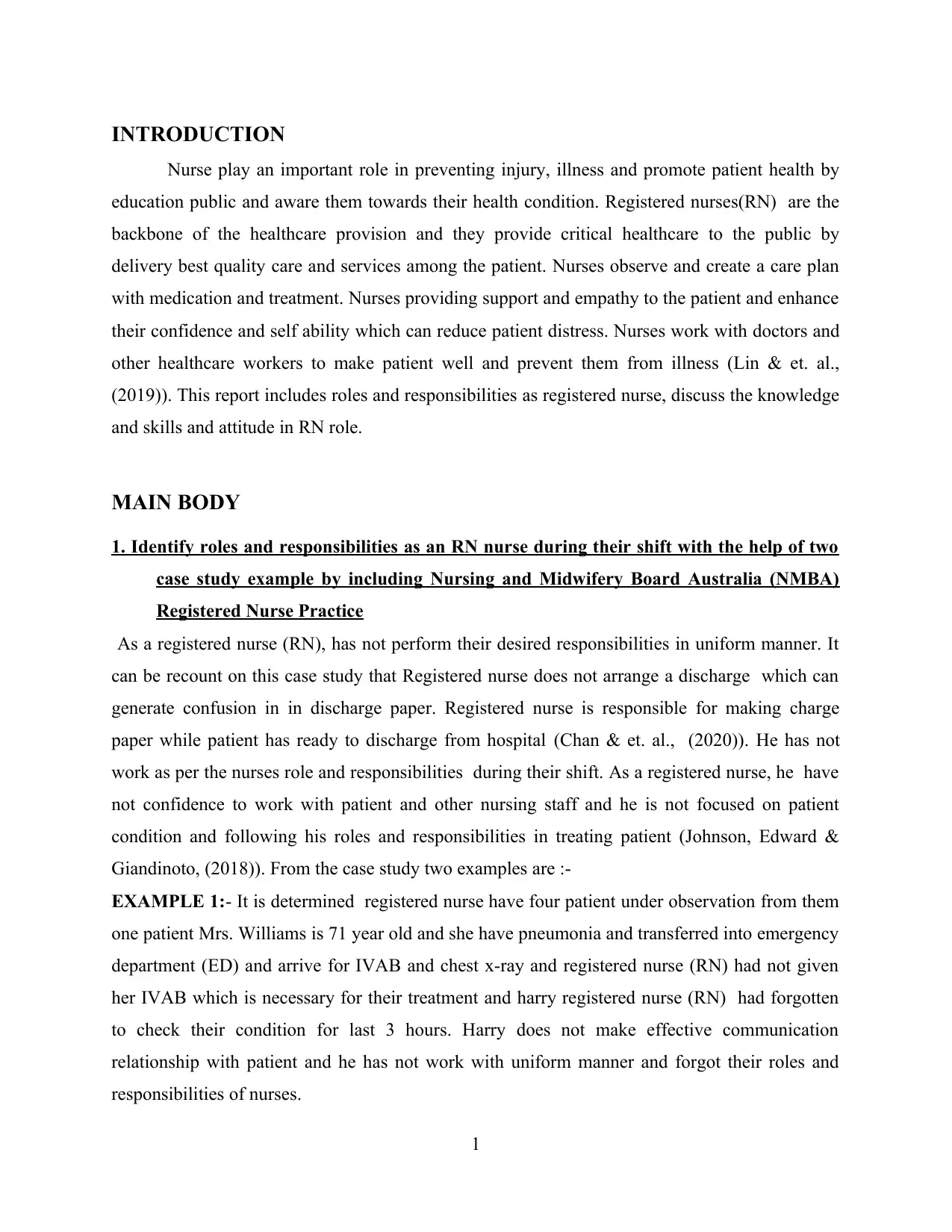
INTRODUCTION
Nurse play an important role in preventing injury, illness and promote patient health by
education public and aware them towards their health condition. Registered nurses(RN) are the
backbone of the healthcare provision and they provide critical healthcare to the public by
delivery best quality care and services among the patient. Nurses observe and create a care plan
with medication and treatment. Nurses providing support and empathy to the patient and enhance
their confidence and self ability which can reduce patient distress. Nurses work with doctors and
other healthcare workers to make patient well and prevent them from illness (Lin & et. al.,
(2019)). This report includes roles and responsibilities as registered nurse, discuss the knowledge
and skills and attitude in RN role.
MAIN BODY
1. Identify roles and responsibilities as an RN nurse during their shift with the help of two
case study example by including Nursing and Midwifery Board Australia (NMBA)
Registered Nurse Practice
As a registered nurse (RN), has not perform their desired responsibilities in uniform manner. It
can be recount on this case study that Registered nurse does not arrange a discharge which can
generate confusion in in discharge paper. Registered nurse is responsible for making charge
paper while patient has ready to discharge from hospital (Chan & et. al., (2020)). He has not
work as per the nurses role and responsibilities during their shift. As a registered nurse, he have
not confidence to work with patient and other nursing staff and he is not focused on patient
condition and following his roles and responsibilities in treating patient (Johnson, Edward &
Giandinoto, (2018)). From the case study two examples are :-
EXAMPLE 1:- It is determined registered nurse have four patient under observation from them
one patient Mrs. Williams is 71 year old and she have pneumonia and transferred into emergency
department (ED) and arrive for IVAB and chest x-ray and registered nurse (RN) had not given
her IVAB which is necessary for their treatment and harry registered nurse (RN) had forgotten
to check their condition for last 3 hours. Harry does not make effective communication
relationship with patient and he has not work with uniform manner and forgot their roles and
responsibilities of nurses.
1
Nurse play an important role in preventing injury, illness and promote patient health by
education public and aware them towards their health condition. Registered nurses(RN) are the
backbone of the healthcare provision and they provide critical healthcare to the public by
delivery best quality care and services among the patient. Nurses observe and create a care plan
with medication and treatment. Nurses providing support and empathy to the patient and enhance
their confidence and self ability which can reduce patient distress. Nurses work with doctors and
other healthcare workers to make patient well and prevent them from illness (Lin & et. al.,
(2019)). This report includes roles and responsibilities as registered nurse, discuss the knowledge
and skills and attitude in RN role.
MAIN BODY
1. Identify roles and responsibilities as an RN nurse during their shift with the help of two
case study example by including Nursing and Midwifery Board Australia (NMBA)
Registered Nurse Practice
As a registered nurse (RN), has not perform their desired responsibilities in uniform manner. It
can be recount on this case study that Registered nurse does not arrange a discharge which can
generate confusion in in discharge paper. Registered nurse is responsible for making charge
paper while patient has ready to discharge from hospital (Chan & et. al., (2020)). He has not
work as per the nurses role and responsibilities during their shift. As a registered nurse, he have
not confidence to work with patient and other nursing staff and he is not focused on patient
condition and following his roles and responsibilities in treating patient (Johnson, Edward &
Giandinoto, (2018)). From the case study two examples are :-
EXAMPLE 1:- It is determined registered nurse have four patient under observation from them
one patient Mrs. Williams is 71 year old and she have pneumonia and transferred into emergency
department (ED) and arrive for IVAB and chest x-ray and registered nurse (RN) had not given
her IVAB which is necessary for their treatment and harry registered nurse (RN) had forgotten
to check their condition for last 3 hours. Harry does not make effective communication
relationship with patient and he has not work with uniform manner and forgot their roles and
responsibilities of nurses.
1
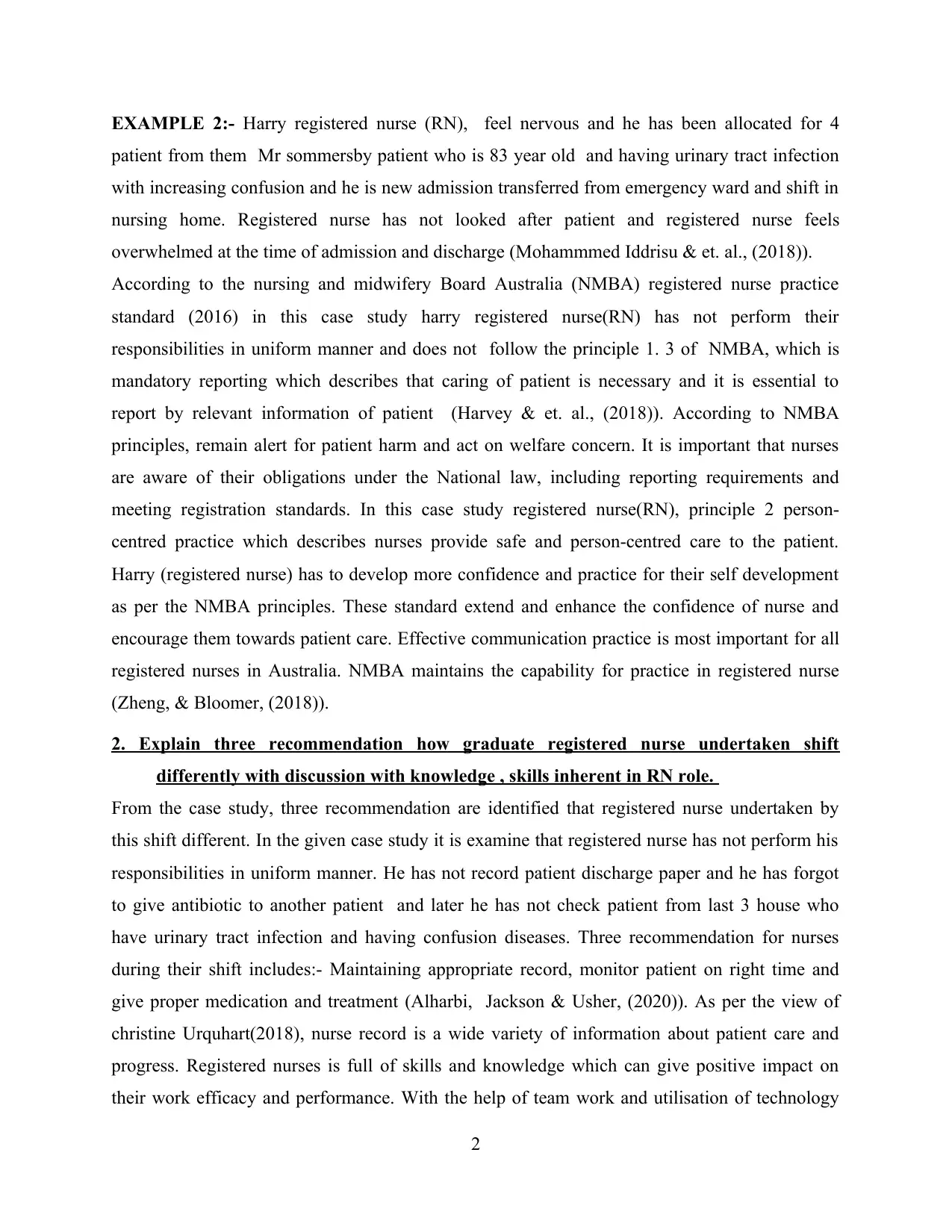
EXAMPLE 2:- Harry registered nurse (RN), feel nervous and he has been allocated for 4
patient from them Mr sommersby patient who is 83 year old and having urinary tract infection
with increasing confusion and he is new admission transferred from emergency ward and shift in
nursing home. Registered nurse has not looked after patient and registered nurse feels
overwhelmed at the time of admission and discharge (Mohammmed Iddrisu & et. al., (2018)).
According to the nursing and midwifery Board Australia (NMBA) registered nurse practice
standard (2016) in this case study harry registered nurse(RN) has not perform their
responsibilities in uniform manner and does not follow the principle 1. 3 of NMBA, which is
mandatory reporting which describes that caring of patient is necessary and it is essential to
report by relevant information of patient (Harvey & et. al., (2018)). According to NMBA
principles, remain alert for patient harm and act on welfare concern. It is important that nurses
are aware of their obligations under the National law, including reporting requirements and
meeting registration standards. In this case study registered nurse(RN), principle 2 person-
centred practice which describes nurses provide safe and person-centred care to the patient.
Harry (registered nurse) has to develop more confidence and practice for their self development
as per the NMBA principles. These standard extend and enhance the confidence of nurse and
encourage them towards patient care. Effective communication practice is most important for all
registered nurses in Australia. NMBA maintains the capability for practice in registered nurse
(Zheng, & Bloomer, (2018)).
2. Explain three recommendation how graduate registered nurse undertaken shift
differently with discussion with knowledge , skills inherent in RN role.
From the case study, three recommendation are identified that registered nurse undertaken by
this shift different. In the given case study it is examine that registered nurse has not perform his
responsibilities in uniform manner. He has not record patient discharge paper and he has forgot
to give antibiotic to another patient and later he has not check patient from last 3 house who
have urinary tract infection and having confusion diseases. Three recommendation for nurses
during their shift includes:- Maintaining appropriate record, monitor patient on right time and
give proper medication and treatment (Alharbi, Jackson & Usher, (2020)). As per the view of
christine Urquhart(2018), nurse record is a wide variety of information about patient care and
progress. Registered nurses is full of skills and knowledge which can give positive impact on
their work efficacy and performance. With the help of team work and utilisation of technology
2
patient from them Mr sommersby patient who is 83 year old and having urinary tract infection
with increasing confusion and he is new admission transferred from emergency ward and shift in
nursing home. Registered nurse has not looked after patient and registered nurse feels
overwhelmed at the time of admission and discharge (Mohammmed Iddrisu & et. al., (2018)).
According to the nursing and midwifery Board Australia (NMBA) registered nurse practice
standard (2016) in this case study harry registered nurse(RN) has not perform their
responsibilities in uniform manner and does not follow the principle 1. 3 of NMBA, which is
mandatory reporting which describes that caring of patient is necessary and it is essential to
report by relevant information of patient (Harvey & et. al., (2018)). According to NMBA
principles, remain alert for patient harm and act on welfare concern. It is important that nurses
are aware of their obligations under the National law, including reporting requirements and
meeting registration standards. In this case study registered nurse(RN), principle 2 person-
centred practice which describes nurses provide safe and person-centred care to the patient.
Harry (registered nurse) has to develop more confidence and practice for their self development
as per the NMBA principles. These standard extend and enhance the confidence of nurse and
encourage them towards patient care. Effective communication practice is most important for all
registered nurses in Australia. NMBA maintains the capability for practice in registered nurse
(Zheng, & Bloomer, (2018)).
2. Explain three recommendation how graduate registered nurse undertaken shift
differently with discussion with knowledge , skills inherent in RN role.
From the case study, three recommendation are identified that registered nurse undertaken by
this shift different. In the given case study it is examine that registered nurse has not perform his
responsibilities in uniform manner. He has not record patient discharge paper and he has forgot
to give antibiotic to another patient and later he has not check patient from last 3 house who
have urinary tract infection and having confusion diseases. Three recommendation for nurses
during their shift includes:- Maintaining appropriate record, monitor patient on right time and
give proper medication and treatment (Alharbi, Jackson & Usher, (2020)). As per the view of
christine Urquhart(2018), nurse record is a wide variety of information about patient care and
progress. Registered nurses is full of skills and knowledge which can give positive impact on
their work efficacy and performance. With the help of team work and utilisation of technology
2
Secure Best Marks with AI Grader
Need help grading? Try our AI Grader for instant feedback on your assignments.
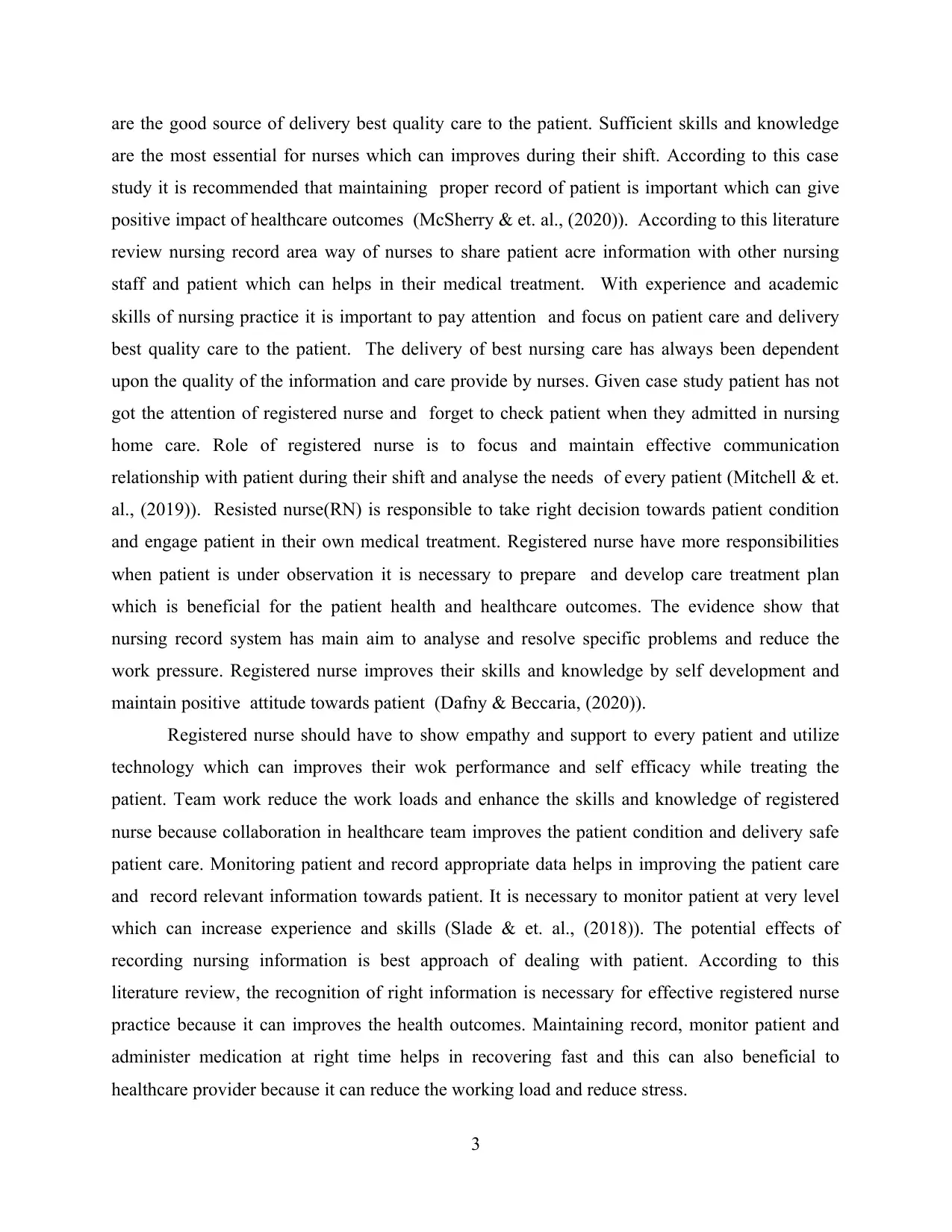
are the good source of delivery best quality care to the patient. Sufficient skills and knowledge
are the most essential for nurses which can improves during their shift. According to this case
study it is recommended that maintaining proper record of patient is important which can give
positive impact of healthcare outcomes (McSherry & et. al., (2020)). According to this literature
review nursing record area way of nurses to share patient acre information with other nursing
staff and patient which can helps in their medical treatment. With experience and academic
skills of nursing practice it is important to pay attention and focus on patient care and delivery
best quality care to the patient. The delivery of best nursing care has always been dependent
upon the quality of the information and care provide by nurses. Given case study patient has not
got the attention of registered nurse and forget to check patient when they admitted in nursing
home care. Role of registered nurse is to focus and maintain effective communication
relationship with patient during their shift and analyse the needs of every patient (Mitchell & et.
al., (2019)). Resisted nurse(RN) is responsible to take right decision towards patient condition
and engage patient in their own medical treatment. Registered nurse have more responsibilities
when patient is under observation it is necessary to prepare and develop care treatment plan
which is beneficial for the patient health and healthcare outcomes. The evidence show that
nursing record system has main aim to analyse and resolve specific problems and reduce the
work pressure. Registered nurse improves their skills and knowledge by self development and
maintain positive attitude towards patient (Dafny & Beccaria, (2020)).
Registered nurse should have to show empathy and support to every patient and utilize
technology which can improves their wok performance and self efficacy while treating the
patient. Team work reduce the work loads and enhance the skills and knowledge of registered
nurse because collaboration in healthcare team improves the patient condition and delivery safe
patient care. Monitoring patient and record appropriate data helps in improving the patient care
and record relevant information towards patient. It is necessary to monitor patient at very level
which can increase experience and skills (Slade & et. al., (2018)). The potential effects of
recording nursing information is best approach of dealing with patient. According to this
literature review, the recognition of right information is necessary for effective registered nurse
practice because it can improves the health outcomes. Maintaining record, monitor patient and
administer medication at right time helps in recovering fast and this can also beneficial to
healthcare provider because it can reduce the working load and reduce stress.
3
are the most essential for nurses which can improves during their shift. According to this case
study it is recommended that maintaining proper record of patient is important which can give
positive impact of healthcare outcomes (McSherry & et. al., (2020)). According to this literature
review nursing record area way of nurses to share patient acre information with other nursing
staff and patient which can helps in their medical treatment. With experience and academic
skills of nursing practice it is important to pay attention and focus on patient care and delivery
best quality care to the patient. The delivery of best nursing care has always been dependent
upon the quality of the information and care provide by nurses. Given case study patient has not
got the attention of registered nurse and forget to check patient when they admitted in nursing
home care. Role of registered nurse is to focus and maintain effective communication
relationship with patient during their shift and analyse the needs of every patient (Mitchell & et.
al., (2019)). Resisted nurse(RN) is responsible to take right decision towards patient condition
and engage patient in their own medical treatment. Registered nurse have more responsibilities
when patient is under observation it is necessary to prepare and develop care treatment plan
which is beneficial for the patient health and healthcare outcomes. The evidence show that
nursing record system has main aim to analyse and resolve specific problems and reduce the
work pressure. Registered nurse improves their skills and knowledge by self development and
maintain positive attitude towards patient (Dafny & Beccaria, (2020)).
Registered nurse should have to show empathy and support to every patient and utilize
technology which can improves their wok performance and self efficacy while treating the
patient. Team work reduce the work loads and enhance the skills and knowledge of registered
nurse because collaboration in healthcare team improves the patient condition and delivery safe
patient care. Monitoring patient and record appropriate data helps in improving the patient care
and record relevant information towards patient. It is necessary to monitor patient at very level
which can increase experience and skills (Slade & et. al., (2018)). The potential effects of
recording nursing information is best approach of dealing with patient. According to this
literature review, the recognition of right information is necessary for effective registered nurse
practice because it can improves the health outcomes. Maintaining record, monitor patient and
administer medication at right time helps in recovering fast and this can also beneficial to
healthcare provider because it can reduce the working load and reduce stress.
3
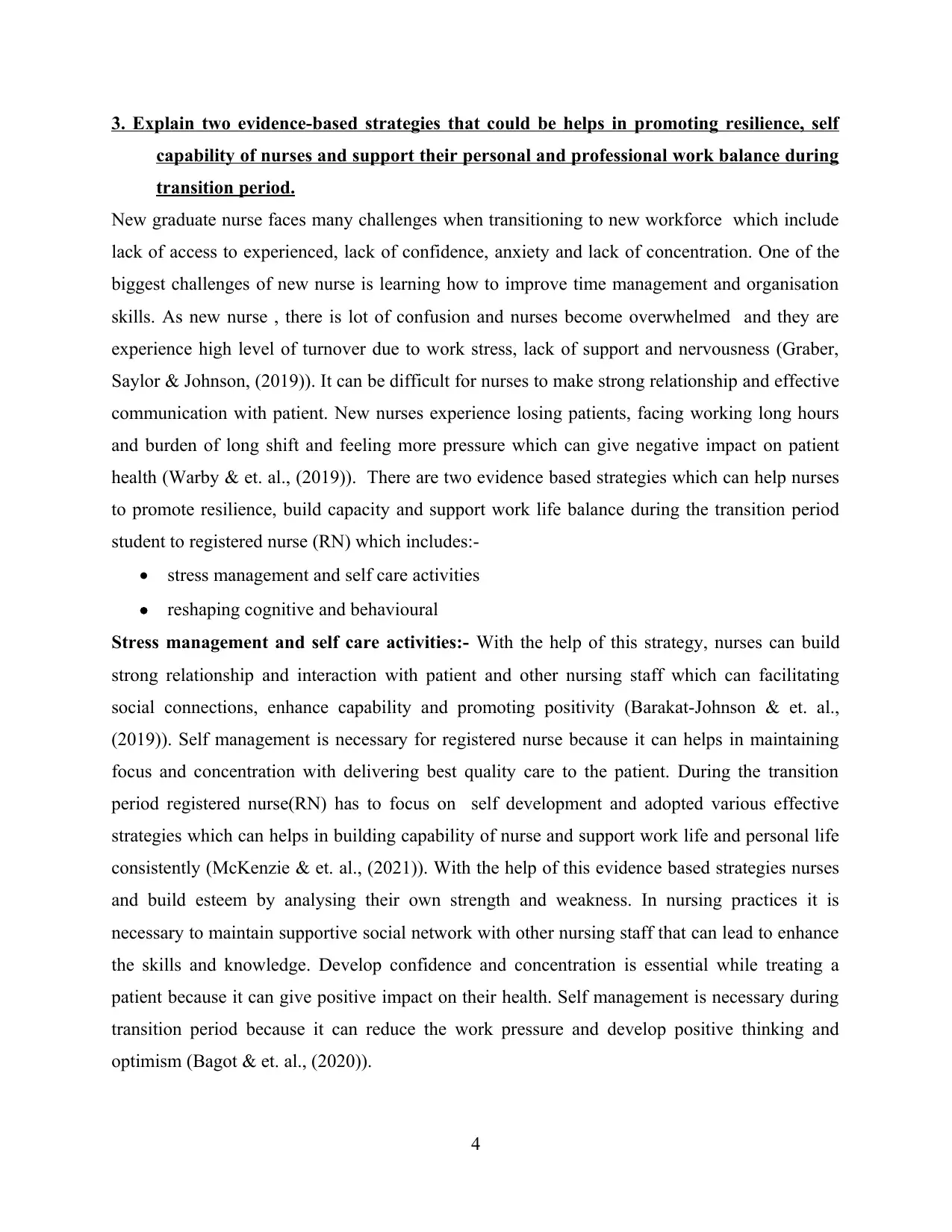
3. Explain two evidence-based strategies that could be helps in promoting resilience, self
capability of nurses and support their personal and professional work balance during
transition period.
New graduate nurse faces many challenges when transitioning to new workforce which include
lack of access to experienced, lack of confidence, anxiety and lack of concentration. One of the
biggest challenges of new nurse is learning how to improve time management and organisation
skills. As new nurse , there is lot of confusion and nurses become overwhelmed and they are
experience high level of turnover due to work stress, lack of support and nervousness (Graber,
Saylor & Johnson, (2019)). It can be difficult for nurses to make strong relationship and effective
communication with patient. New nurses experience losing patients, facing working long hours
and burden of long shift and feeling more pressure which can give negative impact on patient
health (Warby & et. al., (2019)). There are two evidence based strategies which can help nurses
to promote resilience, build capacity and support work life balance during the transition period
student to registered nurse (RN) which includes:-
stress management and self care activities
reshaping cognitive and behavioural
Stress management and self care activities:- With the help of this strategy, nurses can build
strong relationship and interaction with patient and other nursing staff which can facilitating
social connections, enhance capability and promoting positivity (Barakat-Johnson & et. al.,
(2019)). Self management is necessary for registered nurse because it can helps in maintaining
focus and concentration with delivering best quality care to the patient. During the transition
period registered nurse(RN) has to focus on self development and adopted various effective
strategies which can helps in building capability of nurse and support work life and personal life
consistently (McKenzie & et. al., (2021)). With the help of this evidence based strategies nurses
and build esteem by analysing their own strength and weakness. In nursing practices it is
necessary to maintain supportive social network with other nursing staff that can lead to enhance
the skills and knowledge. Develop confidence and concentration is essential while treating a
patient because it can give positive impact on their health. Self management is necessary during
transition period because it can reduce the work pressure and develop positive thinking and
optimism (Bagot & et. al., (2020)).
4
capability of nurses and support their personal and professional work balance during
transition period.
New graduate nurse faces many challenges when transitioning to new workforce which include
lack of access to experienced, lack of confidence, anxiety and lack of concentration. One of the
biggest challenges of new nurse is learning how to improve time management and organisation
skills. As new nurse , there is lot of confusion and nurses become overwhelmed and they are
experience high level of turnover due to work stress, lack of support and nervousness (Graber,
Saylor & Johnson, (2019)). It can be difficult for nurses to make strong relationship and effective
communication with patient. New nurses experience losing patients, facing working long hours
and burden of long shift and feeling more pressure which can give negative impact on patient
health (Warby & et. al., (2019)). There are two evidence based strategies which can help nurses
to promote resilience, build capacity and support work life balance during the transition period
student to registered nurse (RN) which includes:-
stress management and self care activities
reshaping cognitive and behavioural
Stress management and self care activities:- With the help of this strategy, nurses can build
strong relationship and interaction with patient and other nursing staff which can facilitating
social connections, enhance capability and promoting positivity (Barakat-Johnson & et. al.,
(2019)). Self management is necessary for registered nurse because it can helps in maintaining
focus and concentration with delivering best quality care to the patient. During the transition
period registered nurse(RN) has to focus on self development and adopted various effective
strategies which can helps in building capability of nurse and support work life and personal life
consistently (McKenzie & et. al., (2021)). With the help of this evidence based strategies nurses
and build esteem by analysing their own strength and weakness. In nursing practices it is
necessary to maintain supportive social network with other nursing staff that can lead to enhance
the skills and knowledge. Develop confidence and concentration is essential while treating a
patient because it can give positive impact on their health. Self management is necessary during
transition period because it can reduce the work pressure and develop positive thinking and
optimism (Bagot & et. al., (2020)).
4
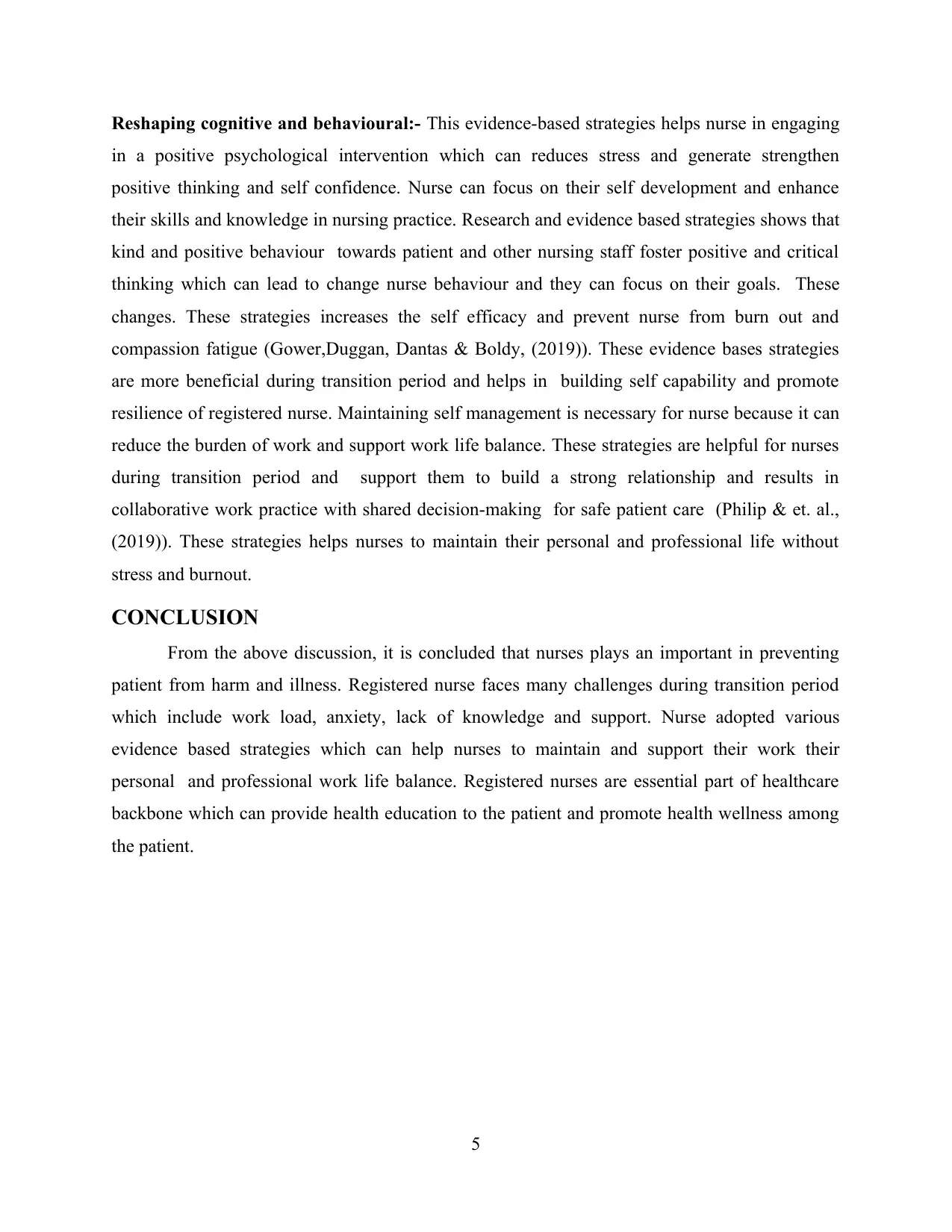
Reshaping cognitive and behavioural:- This evidence-based strategies helps nurse in engaging
in a positive psychological intervention which can reduces stress and generate strengthen
positive thinking and self confidence. Nurse can focus on their self development and enhance
their skills and knowledge in nursing practice. Research and evidence based strategies shows that
kind and positive behaviour towards patient and other nursing staff foster positive and critical
thinking which can lead to change nurse behaviour and they can focus on their goals. These
changes. These strategies increases the self efficacy and prevent nurse from burn out and
compassion fatigue (Gower,Duggan, Dantas & Boldy, (2019)). These evidence bases strategies
are more beneficial during transition period and helps in building self capability and promote
resilience of registered nurse. Maintaining self management is necessary for nurse because it can
reduce the burden of work and support work life balance. These strategies are helpful for nurses
during transition period and support them to build a strong relationship and results in
collaborative work practice with shared decision-making for safe patient care (Philip & et. al.,
(2019)). These strategies helps nurses to maintain their personal and professional life without
stress and burnout.
CONCLUSION
From the above discussion, it is concluded that nurses plays an important in preventing
patient from harm and illness. Registered nurse faces many challenges during transition period
which include work load, anxiety, lack of knowledge and support. Nurse adopted various
evidence based strategies which can help nurses to maintain and support their work their
personal and professional work life balance. Registered nurses are essential part of healthcare
backbone which can provide health education to the patient and promote health wellness among
the patient.
5
in a positive psychological intervention which can reduces stress and generate strengthen
positive thinking and self confidence. Nurse can focus on their self development and enhance
their skills and knowledge in nursing practice. Research and evidence based strategies shows that
kind and positive behaviour towards patient and other nursing staff foster positive and critical
thinking which can lead to change nurse behaviour and they can focus on their goals. These
changes. These strategies increases the self efficacy and prevent nurse from burn out and
compassion fatigue (Gower,Duggan, Dantas & Boldy, (2019)). These evidence bases strategies
are more beneficial during transition period and helps in building self capability and promote
resilience of registered nurse. Maintaining self management is necessary for nurse because it can
reduce the burden of work and support work life balance. These strategies are helpful for nurses
during transition period and support them to build a strong relationship and results in
collaborative work practice with shared decision-making for safe patient care (Philip & et. al.,
(2019)). These strategies helps nurses to maintain their personal and professional life without
stress and burnout.
CONCLUSION
From the above discussion, it is concluded that nurses plays an important in preventing
patient from harm and illness. Registered nurse faces many challenges during transition period
which include work load, anxiety, lack of knowledge and support. Nurse adopted various
evidence based strategies which can help nurses to maintain and support their work their
personal and professional work life balance. Registered nurses are essential part of healthcare
backbone which can provide health education to the patient and promote health wellness among
the patient.
5
Paraphrase This Document
Need a fresh take? Get an instant paraphrase of this document with our AI Paraphraser
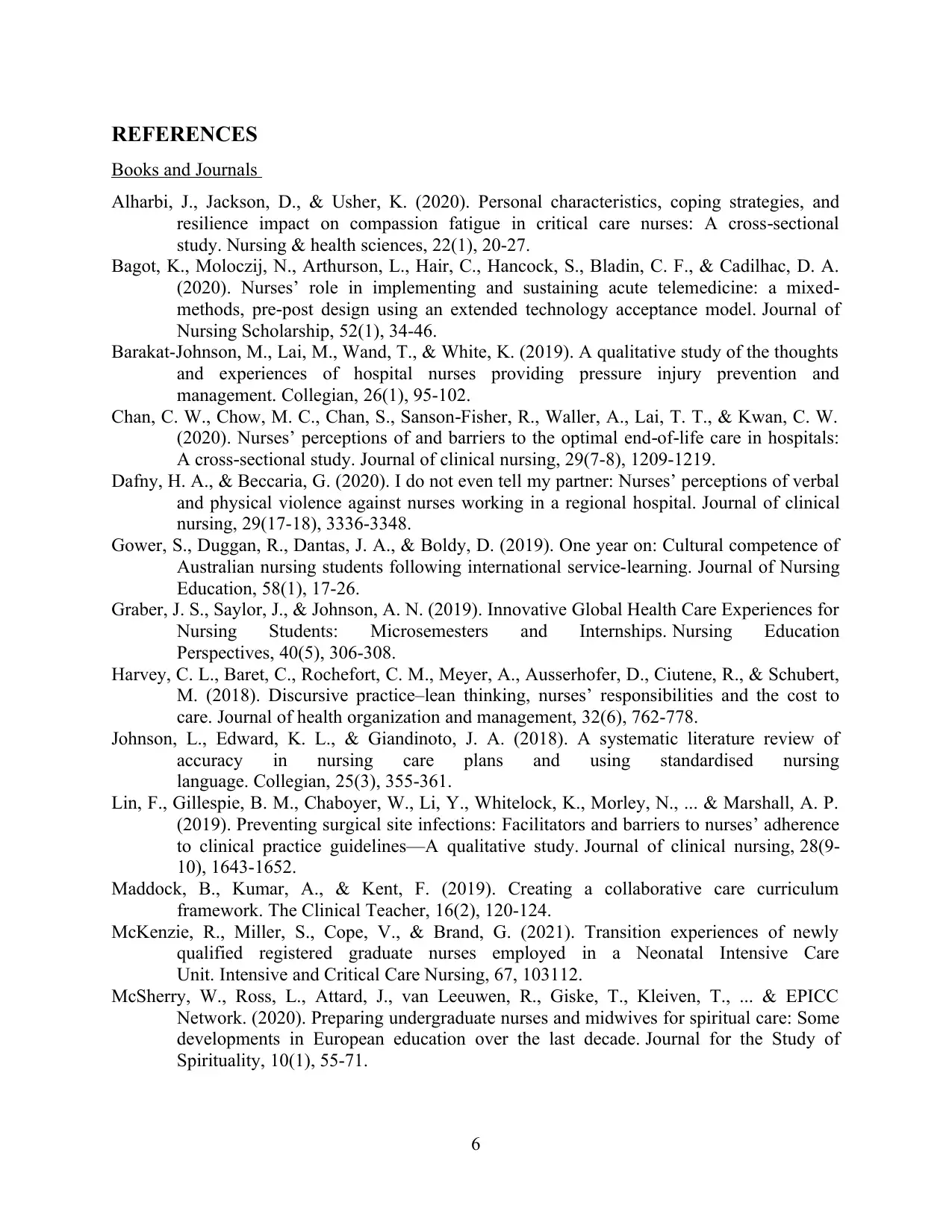
REFERENCES
Books and Journals
Alharbi, J., Jackson, D., & Usher, K. (2020). Personal characteristics, coping strategies, and
resilience impact on compassion fatigue in critical care nurses: A cross sectional‐
study. Nursing & health sciences, 22(1), 20-27.
Bagot, K., Moloczij, N., Arthurson, L., Hair, C., Hancock, S., Bladin, C. F., & Cadilhac, D. A.
(2020). Nurses’ role in implementing and sustaining acute telemedicine: a mixed‐
methods, pre post design using an extended technology acceptance model.‐ Journal of
Nursing Scholarship, 52(1), 34-46.
Barakat-Johnson, M., Lai, M., Wand, T., & White, K. (2019). A qualitative study of the thoughts
and experiences of hospital nurses providing pressure injury prevention and
management. Collegian, 26(1), 95-102.
Chan, C. W., Chow, M. C., Chan, S., Sanson Fisher, R., Waller, A., Lai, T. T., & Kwan, C. W.‐
(2020). Nurses’ perceptions of and barriers to the optimal end of life care in hospitals:‐ ‐
A cross sectional study.‐ Journal of clinical nursing, 29(7-8), 1209-1219.
Dafny, H. A., & Beccaria, G. (2020). I do not even tell my partner: Nurses’ perceptions of verbal
and physical violence against nurses working in a regional hospital. Journal of clinical
nursing, 29(17-18), 3336-3348.
Gower, S., Duggan, R., Dantas, J. A., & Boldy, D. (2019). One year on: Cultural competence of
Australian nursing students following international service-learning. Journal of Nursing
Education, 58(1), 17-26.
Graber, J. S., Saylor, J., & Johnson, A. N. (2019). Innovative Global Health Care Experiences for
Nursing Students: Microsemesters and Internships. Nursing Education
Perspectives, 40(5), 306-308.
Harvey, C. L., Baret, C., Rochefort, C. M., Meyer, A., Ausserhofer, D., Ciutene, R., & Schubert,
M. (2018). Discursive practice–lean thinking, nurses’ responsibilities and the cost to
care. Journal of health organization and management, 32(6), 762-778.
Johnson, L., Edward, K. L., & Giandinoto, J. A. (2018). A systematic literature review of
accuracy in nursing care plans and using standardised nursing
language. Collegian, 25(3), 355-361.
Lin, F., Gillespie, B. M., Chaboyer, W., Li, Y., Whitelock, K., Morley, N., ... & Marshall, A. P.
(2019). Preventing surgical site infections: Facilitators and barriers to nurses’ adherence
to clinical practice guidelines—A qualitative study. Journal of clinical nursing, 28(9-
10), 1643-1652.
Maddock, B., Kumar, A., & Kent, F. (2019). Creating a collaborative care curriculum
framework. The Clinical Teacher, 16(2), 120-124.
McKenzie, R., Miller, S., Cope, V., & Brand, G. (2021). Transition experiences of newly
qualified registered graduate nurses employed in a Neonatal Intensive Care
Unit. Intensive and Critical Care Nursing, 67, 103112.
McSherry, W., Ross, L., Attard, J., van Leeuwen, R., Giske, T., Kleiven, T., ... & EPICC
Network. (2020). Preparing undergraduate nurses and midwives for spiritual care: Some
developments in European education over the last decade. Journal for the Study of
Spirituality, 10(1), 55-71.
6
Books and Journals
Alharbi, J., Jackson, D., & Usher, K. (2020). Personal characteristics, coping strategies, and
resilience impact on compassion fatigue in critical care nurses: A cross sectional‐
study. Nursing & health sciences, 22(1), 20-27.
Bagot, K., Moloczij, N., Arthurson, L., Hair, C., Hancock, S., Bladin, C. F., & Cadilhac, D. A.
(2020). Nurses’ role in implementing and sustaining acute telemedicine: a mixed‐
methods, pre post design using an extended technology acceptance model.‐ Journal of
Nursing Scholarship, 52(1), 34-46.
Barakat-Johnson, M., Lai, M., Wand, T., & White, K. (2019). A qualitative study of the thoughts
and experiences of hospital nurses providing pressure injury prevention and
management. Collegian, 26(1), 95-102.
Chan, C. W., Chow, M. C., Chan, S., Sanson Fisher, R., Waller, A., Lai, T. T., & Kwan, C. W.‐
(2020). Nurses’ perceptions of and barriers to the optimal end of life care in hospitals:‐ ‐
A cross sectional study.‐ Journal of clinical nursing, 29(7-8), 1209-1219.
Dafny, H. A., & Beccaria, G. (2020). I do not even tell my partner: Nurses’ perceptions of verbal
and physical violence against nurses working in a regional hospital. Journal of clinical
nursing, 29(17-18), 3336-3348.
Gower, S., Duggan, R., Dantas, J. A., & Boldy, D. (2019). One year on: Cultural competence of
Australian nursing students following international service-learning. Journal of Nursing
Education, 58(1), 17-26.
Graber, J. S., Saylor, J., & Johnson, A. N. (2019). Innovative Global Health Care Experiences for
Nursing Students: Microsemesters and Internships. Nursing Education
Perspectives, 40(5), 306-308.
Harvey, C. L., Baret, C., Rochefort, C. M., Meyer, A., Ausserhofer, D., Ciutene, R., & Schubert,
M. (2018). Discursive practice–lean thinking, nurses’ responsibilities and the cost to
care. Journal of health organization and management, 32(6), 762-778.
Johnson, L., Edward, K. L., & Giandinoto, J. A. (2018). A systematic literature review of
accuracy in nursing care plans and using standardised nursing
language. Collegian, 25(3), 355-361.
Lin, F., Gillespie, B. M., Chaboyer, W., Li, Y., Whitelock, K., Morley, N., ... & Marshall, A. P.
(2019). Preventing surgical site infections: Facilitators and barriers to nurses’ adherence
to clinical practice guidelines—A qualitative study. Journal of clinical nursing, 28(9-
10), 1643-1652.
Maddock, B., Kumar, A., & Kent, F. (2019). Creating a collaborative care curriculum
framework. The Clinical Teacher, 16(2), 120-124.
McKenzie, R., Miller, S., Cope, V., & Brand, G. (2021). Transition experiences of newly
qualified registered graduate nurses employed in a Neonatal Intensive Care
Unit. Intensive and Critical Care Nursing, 67, 103112.
McSherry, W., Ross, L., Attard, J., van Leeuwen, R., Giske, T., Kleiven, T., ... & EPICC
Network. (2020). Preparing undergraduate nurses and midwives for spiritual care: Some
developments in European education over the last decade. Journal for the Study of
Spirituality, 10(1), 55-71.
6
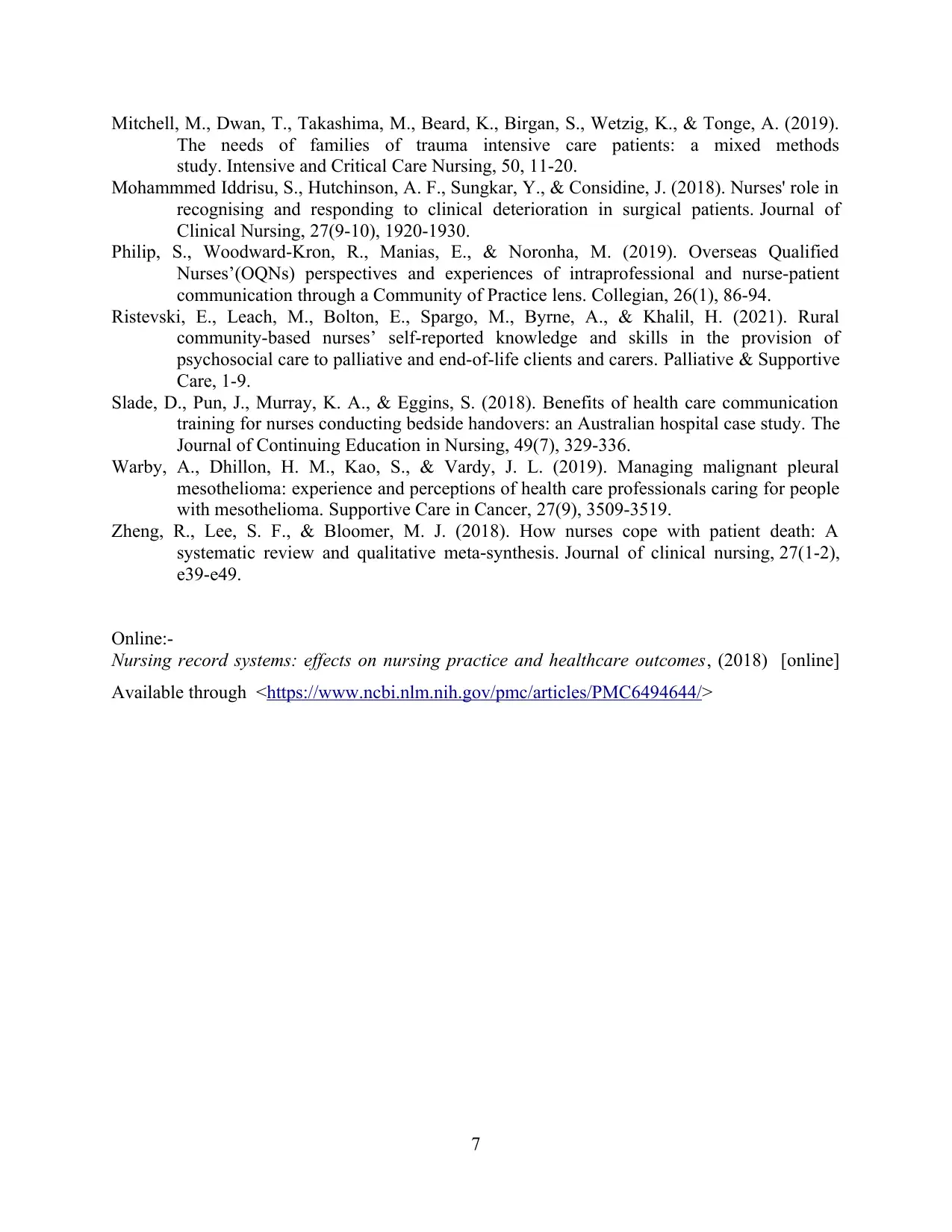
Mitchell, M., Dwan, T., Takashima, M., Beard, K., Birgan, S., Wetzig, K., & Tonge, A. (2019).
The needs of families of trauma intensive care patients: a mixed methods
study. Intensive and Critical Care Nursing, 50, 11-20.
Mohammmed Iddrisu, S., Hutchinson, A. F., Sungkar, Y., & Considine, J. (2018). Nurses' role in
recognising and responding to clinical deterioration in surgical patients. Journal of
Clinical Nursing, 27(9-10), 1920-1930.
Philip, S., Woodward-Kron, R., Manias, E., & Noronha, M. (2019). Overseas Qualified
Nurses’(OQNs) perspectives and experiences of intraprofessional and nurse-patient
communication through a Community of Practice lens. Collegian, 26(1), 86-94.
Ristevski, E., Leach, M., Bolton, E., Spargo, M., Byrne, A., & Khalil, H. (2021). Rural
community-based nurses’ self-reported knowledge and skills in the provision of
psychosocial care to palliative and end-of-life clients and carers. Palliative & Supportive
Care, 1-9.
Slade, D., Pun, J., Murray, K. A., & Eggins, S. (2018). Benefits of health care communication
training for nurses conducting bedside handovers: an Australian hospital case study. The
Journal of Continuing Education in Nursing, 49(7), 329-336.
Warby, A., Dhillon, H. M., Kao, S., & Vardy, J. L. (2019). Managing malignant pleural
mesothelioma: experience and perceptions of health care professionals caring for people
with mesothelioma. Supportive Care in Cancer, 27(9), 3509-3519.
Zheng, R., Lee, S. F., & Bloomer, M. J. (2018). How nurses cope with patient death: A
systematic review and qualitative meta synthesis.‐ Journal of clinical nursing, 27(1-2),
e39-e49.
Online:-
Nursing record systems: effects on nursing practice and healthcare outcomes, (2018) [online]
Available through <https://www.ncbi.nlm.nih.gov/pmc/articles/PMC6494644/>
7
The needs of families of trauma intensive care patients: a mixed methods
study. Intensive and Critical Care Nursing, 50, 11-20.
Mohammmed Iddrisu, S., Hutchinson, A. F., Sungkar, Y., & Considine, J. (2018). Nurses' role in
recognising and responding to clinical deterioration in surgical patients. Journal of
Clinical Nursing, 27(9-10), 1920-1930.
Philip, S., Woodward-Kron, R., Manias, E., & Noronha, M. (2019). Overseas Qualified
Nurses’(OQNs) perspectives and experiences of intraprofessional and nurse-patient
communication through a Community of Practice lens. Collegian, 26(1), 86-94.
Ristevski, E., Leach, M., Bolton, E., Spargo, M., Byrne, A., & Khalil, H. (2021). Rural
community-based nurses’ self-reported knowledge and skills in the provision of
psychosocial care to palliative and end-of-life clients and carers. Palliative & Supportive
Care, 1-9.
Slade, D., Pun, J., Murray, K. A., & Eggins, S. (2018). Benefits of health care communication
training for nurses conducting bedside handovers: an Australian hospital case study. The
Journal of Continuing Education in Nursing, 49(7), 329-336.
Warby, A., Dhillon, H. M., Kao, S., & Vardy, J. L. (2019). Managing malignant pleural
mesothelioma: experience and perceptions of health care professionals caring for people
with mesothelioma. Supportive Care in Cancer, 27(9), 3509-3519.
Zheng, R., Lee, S. F., & Bloomer, M. J. (2018). How nurses cope with patient death: A
systematic review and qualitative meta synthesis.‐ Journal of clinical nursing, 27(1-2),
e39-e49.
Online:-
Nursing record systems: effects on nursing practice and healthcare outcomes, (2018) [online]
Available through <https://www.ncbi.nlm.nih.gov/pmc/articles/PMC6494644/>
7
1 out of 9
Related Documents
Your All-in-One AI-Powered Toolkit for Academic Success.
+13062052269
info@desklib.com
Available 24*7 on WhatsApp / Email
![[object Object]](/_next/static/media/star-bottom.7253800d.svg)
Unlock your academic potential
© 2024 | Zucol Services PVT LTD | All rights reserved.




